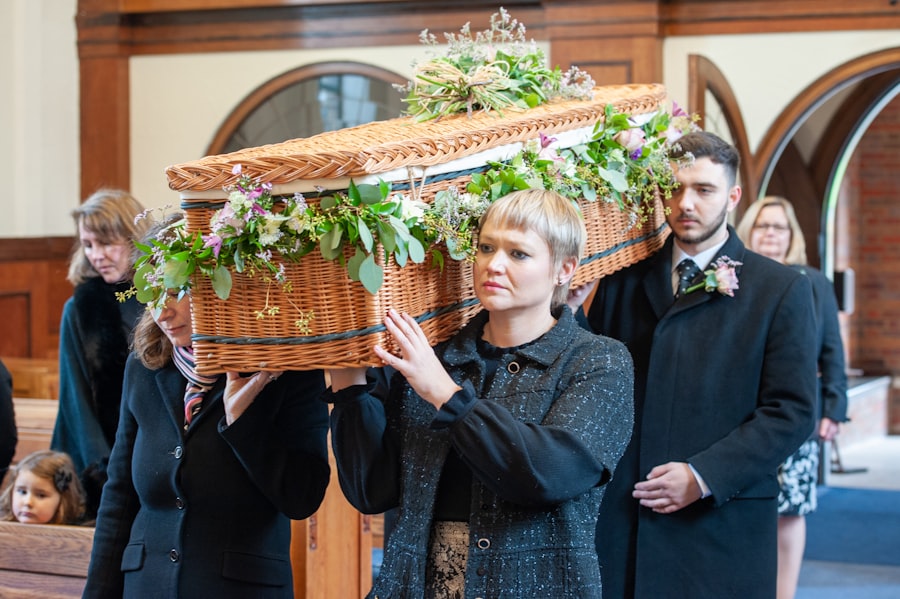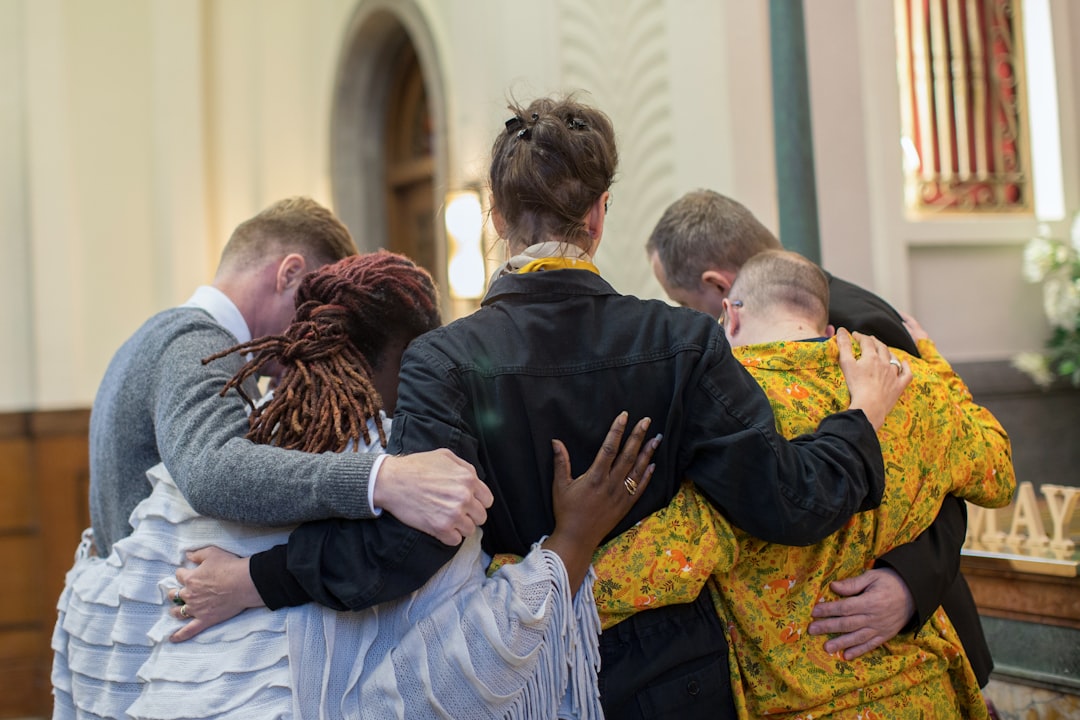As an experienced humanist funeral celebrant, I have come to appreciate the profound significance of the role I play during one of life’s most challenging moments. An officiant is not merely a facilitator of a ceremony; I am a guide who helps families navigate their grief while celebrating the life of their loved one. My responsibilities extend beyond delivering a tribute or leading a service; I strive to create a meaningful experience that reflects the unique essence of the deceased.
This involves understanding their life story, values, and the relationships they cherished. Each ceremony I conduct is tailored to encapsulate the spirit of the individual, allowing family and friends to find solace in shared memories and collective mourning. In my role, I also serve as a bridge between the family and the broader community, helping to foster connections that can be incredibly healing.
I recognise that funerals are not just about saying goodbye; they are also about celebrating a life well-lived. This duality requires sensitivity and an understanding of the emotional landscape that families traverse during this time. I capture all of the stories, anecdotes, and reflections from loved ones, weaving these elements into a narrative that honours the deceased while providing comfort to those left behind.
The role of an officiant is multifaceted, requiring empathy, creativity, and a deep respect for the diverse ways in which people grieve and remember.
Key Takeaways
- The officiant plays a crucial role in leading the funeral service and providing comfort to the bereaved.
- It is important to consider the religious or spiritual beliefs of the deceased when choosing an officiant. I am a non religious (humanist) celebrant.
- Finding an officiant who reflects the values and beliefs of the deceased can help personalise the funeral service.
- Seeking recommendations and referrals from friends, family, or funeral directors can help in finding a suitable officiant.
- Meeting with potential officiants to discuss the funeral service allows for a better understanding of their approach and compatibility with the family’s needs.
- It is essential to ensure that the chosen officiant is sensitive and compassionate towards the grieving family and friends.
- Discussing the officiant’s fee and availability upfront can help in making an informed decision.
- Finalising the decision and communicating openly with the officiant about the funeral service details is crucial for a meaningful and respectful ceremony.
Considering the Religious or Spiritual Beliefs of the Deceased
When planning a funeral service, it is essential to consider the religious or spiritual beliefs of the deceased. These beliefs often shape not only how individuals view life and death but also how they wish to be remembered. As a humanist celebrant, I approach this aspect with great care – I am a non religious celebrant – so might not be right for a family that religious beliefs. Humanism recognises that each person’s beliefs are deeply personal and can vary widely even within families.
Understanding these nuances is crucial in crafting a service that resonates with the values and wishes of the deceased. In my experience, engaging in open conversations with family members about their loved one’s beliefs can reveal much about how they would like their life to be celebrated.
I often encourage families to share stories that highlight their loved one’s life journey or significant moments that shaped their worldview. This dialogue not only helps me to create a more personalised service but also allows family members to reflect on their own beliefs and how they intersect with those of the deceased. By honoring these spiritual dimensions, I aim to create a ceremony that feels authentic and respectful, providing a space for both remembrance and reflection.
Finding an Officiant Who Reflects the Deceased’s Values and Beliefs

Finding an officiant who truly reflects the values and beliefs of the deceased is paramount in ensuring that the funeral service is meaningful and authentic. As someone who has dedicated my career to this calling, I understand that not all officiants are created equal; each brings their own style, philosophy, and approach to the table. It is essential for families to seek someone who resonates with their loved one’s spirit and can articulate their story in a way that feels genuine.
This alignment can make all the difference in creating a service that honours the deceased’s legacy while providing comfort to those in attendance. In my practice, I often emphasise the importance of personal connection between the officiant and the family. When families choose me, they are not just selecting someone to lead a ceremony; they are inviting me into their intimate space of grief and remembrance.
I take this responsibility seriously, ensuring that I invest time in understanding their loved one’s life, values, and relationships. This connection allows me to craft a service that not only reflects the deceased’s beliefs but also resonates with those who gather to pay their respects. Ultimately, finding an officiant who embodies these qualities can transform a funeral into a powerful tribute that honours both life and love.
Seeking Recommendations and Referrals for Officiants
When it comes to selecting an officiant for a funeral service, seeking recommendations and referrals can be an invaluable step in the process. Families often find comfort in hearing from others who have had positive experiences with specific officiants. Personal recommendations can provide insights into an officiant’s style, approach, and ability to connect with grieving families. I often find myself doing ceremonies for families I have already worked with before.
In my experience, word-of-mouth referrals often lead families to individuals who have demonstrated compassion and skill in navigating the complexities of funeral services. In addition to personal recommendations, many families turn to online resources or local funeral homes for guidance in finding an officiant. These platforms often provide reviews and testimonials that can help families gauge an officiant’s reputation within the community.
However, while these resources can be helpful, I always encourage families to trust their instincts when making this important decision. The right officiant should evoke a sense of comfort and understanding, as they will play a pivotal role in guiding families through their grief journey. By seeking recommendations and taking the time to research potential officiants, families can find someone who aligns with their values and can create a meaningful tribute for their loved one.
Meeting with Potential Officiants to Discuss the Funeral Service
Once families have identified potential officiants, meeting with them becomes an essential step in determining if they are the right fit for conducting the funeral service. During these meetings, I prioritize creating an open and welcoming environment where family members feel comfortable sharing their thoughts and emotions. It is crucial for me to listen attentively as they express their wishes for the service, as well as any specific elements they would like included.
This collaborative approach allows me to gain insight into their loved one’s personality and preferences while fostering trust between us. In these discussions, I also take the opportunity to share my own philosophy regarding funerals and memorial services. As a humanist celebrant, I emphasize the importance of celebrating life through storytelling and reflection rather than adhering strictly to traditional rituals.
This perspective often resonates with families seeking a more personalised approach to honoring their loved one’s memory. By engaging in meaningful conversations about expectations, preferences, and any concerns they may have, I aim to ensure that everyone feels heard and valued throughout this process. Ultimately, these meetings serve as a foundation for building a strong partnership between myself and the family as we work together to create a heartfelt tribute.
Ensuring the Officiant is Sensitive and Compassionate
Sensitivity and compassion are two qualities that are non-negotiable for anyone serving as an officiant at a funeral service. Grief manifests in myriad ways, and as an experienced celebrant, I have witnessed firsthand how deeply personal this journey can be for each individual involved. It is my responsibility to approach every family with empathy, recognising that they may be navigating complex emotions during this time of loss.
My goal is to create an atmosphere where family members feel safe expressing their feelings—whether it be sorrow, anger, or even moments of joy as they remember their loved one. To ensure that I embody these qualities throughout the planning process and during the service itself, I make it a point to remain attuned to the emotional cues of those around me. This means being present in conversations without rushing them or imposing my own agenda on their grief journey.
I strive to validate their feelings by acknowledging their pain while also encouraging them to share stories that celebrate their loved one’s life. By fostering this open dialogue, I hope to create a space where healing can begin—a place where laughter can intermingle with tears as we honour a life well-lived together.
FAQs
What is an officiant for a funeral?
An officiant for a funeral is a person who leads the funeral or memorial service. TWhat does an officiant for a funeral do?
The officiant for a funeral is responsible for leading the service, offering words of comfort and support, and helping to create a meaningful and respectful tribute to the deceased.
Do officiants for funerals have to be religious?
No, officiants for funerals do not have to be religious. There are many non-religious celebrants such as me, who are trained to lead funeral and memorial services in a secular or non-denominational way – we are humanists.


